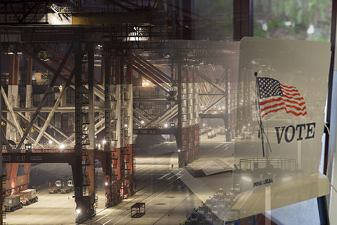|
By Cecile Entleitner, Associate, Blakey & Agnew
Presidential campaigns have been in full swing for several months now as candidates prepare for our country's 59th presidential election on November 3, 2020. So far, 18 states have held their primary events and many voters in other states across the country have already began casting their ballots through early and absentee voting. Adding a whole new meaning to "March Madness," a total of 25 states and three U.S. territories will hold their primary elections or caucuses this month. On Super Tuesday alone, 14 states controlling approximately 40 percent of delegates took to the polls. Though infrastructure policy hasn't dominated debate and campaign rally talking points, the nonprofit organization United for Infrastructure held the Moving America Forward forum in February to hear from candidates on this important issue. Four candidates participated, of which only Joe Biden remains in the race. However, the two current frontrunners for the Democratic nomination as well as President Trump have released infrastructure policy platforms. Here's a closer look at these proposals, with an eye toward freight provisions, if specified by the candidate.
Former Vice President Joe Biden calls for a $1.3 trillion investment over ten years, spanning all modes of transportation as well as broadband, greenhouse gas emissions reduction provisions, and emerging technologies. He plans to increase investments in freight projects by providing $3.5 billion annually for grants through the Better Utilizing Investments to Leverage Development (BUILD) program available to freight and various other transportation projects and the freight-focused Infrastructure for Rebuilding America (INFRA) program. He would also invest $400 billion over ten years for clean energy research, including the implementation of technologies for low-carbon long-haul trucks, ships, planes, and the electrification of passenger and freight rail networks. His infrastructure plan includes a provision that would ensure all fees collected into the Harbor Maintenance Trust Fund are used for port improvement projects. Vice President Biden proposes paying for these investments by reversing the Tax Cuts and Jobs Act of 2017, ending fossil fuel subsidies, and securing new revenue streams to stabilize the Highway Trust Fund.
Senator Bernie Sanders announced his infrastructure proposal as part of the $16.3 trillion Green New Deal focused on environmental provisions, investing in sustainable energy, and infrastructure system resiliency. Incorporated in the plan is the Rebuild America Act of 2015 legislation introduced by Senator Sanders during the 114th Congress, which provides $75 billion for the Highway Trust Fund to improve roads, bridges, and
|

other transportation infrastructure, and an another $2 billion for additional surface transportation needs. The plan would provide $5 billion annually for the BUILD grant program and intends to ensure freight transportation is "fully renewable by 2030 at the latest." According to Senator Sanders, the plan will pay for itself over 15 years, in part by fees and taxes on the fossil fuel industry, ending fossil fuel subsidies, income tax revenue generated by jobs created through the plan, and reduced military spending.
In early February, the White House released President Trump's fiscal year 2021 budget request, which included a ten-year $810 billion surface transportation reauthorization proposal and an additional $190 billion in funding authority, for a total investment of $1 trillion over ten years. The budget provides $1 billion each for the BUILD and INFRA grant programs for FY21 but does not specify future amounts. The Consolidated Rail Infrastructure and Safety Improvements (CRISI) grant program would receive $3.9 billion over ten years, including $330 million in FY21. The proposal would eliminate the Port Infrastructure Development Program, as the Administration argues "port projects should compete with other freight-related projects on an equal footing" through other existing programs such as INFRA and BUILD.
The $190 billion one-time budget authority proposal includes $60 billion for a new Building Infrastructure Great grants program. These funds would go toward "mega-project" grants focused on the rehabilitation and expansion of core infrastructure. It would also provide $50 billion for a new Moving America's Freight Safely and Efficiently program. The program would allocate both formula funding and discretionary grants for highway, rail, port, and waterway freight projects with significant economic, mobility, and safety benefits. During testimony on Capitol Hill February 27, Transportation Secretary Chao stated the proposal's details and legislative language were currently under review by the Administration and would be shared with Congress once completed.
Blakey & Agnew, LLC is a public affairs and
communications consulting firm based in
Washington, DC.
|


